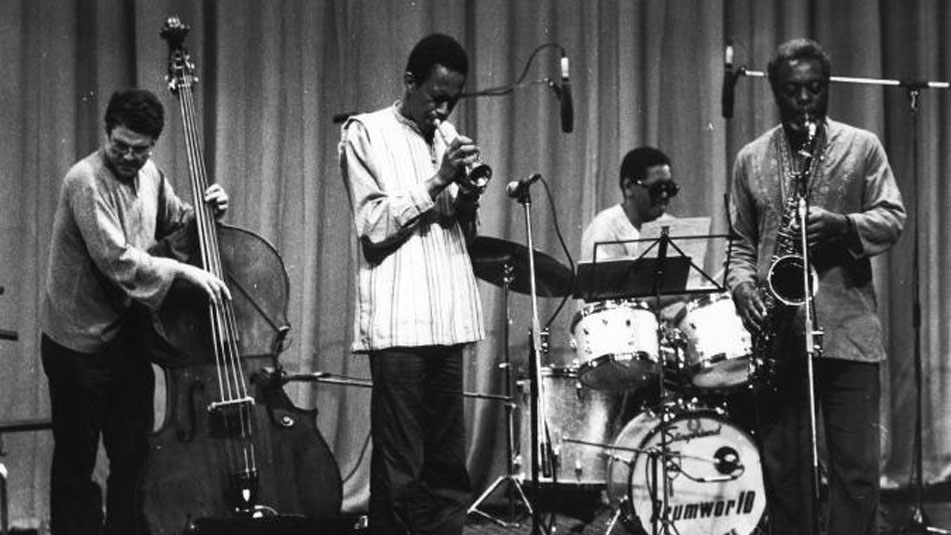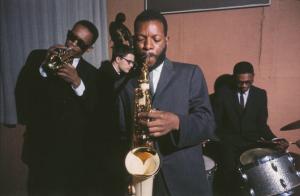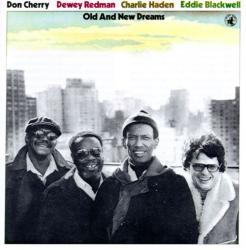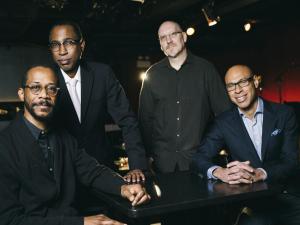REMEMBERING OLD AND NEW DREAMS
August 29, 2018 | by Rusty Aceves

Old and New Dreams (L-R): Charlie Haden, Don Cherry, Ed Blackwell, Dewey Redman
We look back at the band that inspired Still Dreaming, Joshua Redman’s new quartet project including Ron Miles, Scott Colley and Brian Blade, which performs four nights at SFJAZZ on September 13-16, 2018.
A Pulitzer Prize, a pioneering body of work spanning nearly six decades, and a legacy of influence that directed the course of an art form should be more than enough to certify an artist’s place in the creative firmament. Yet, to this day, when the name Ornette Coleman is brought up among jazz fans, there still remains a lingering controversy as to the value of his artistic contributions to the music, and even his legitimacy as a musician. With an unorthodox approach to harmonic structures and a categorical rejection of the hierarchies of “soloist” versus “ensemble,” Coleman was, for better or worse, seen as an iconoclast. That the saxophonist’s work remains controversial speaks volumes about the impact he had on the jazz establishment and the undeniable paradigm shift he created.
 A month after his third album was released, 1959’s audaciously titled The Shape of Jazz to Come, Coleman and his quartet began what was initially intended to be a two-week residency at New York’s haven for “the next big thing,” the Five Spot Café in the East Village. Extended to ten weeks from the original two and followed after a brief break with a four-month resumption, Coleman’s engagement was his official introduction to the New York scene after relocating from Los Angeles, and was met with both celebration and derision, drawing attendees ranging from Miles Davis and Leonard Bernstein to Norman Mailer and Thomas Pynchon. It also established the careers of the young sidemen who made up Coleman’s epochal quartet, namely trumpeter Don Cherry, bassist Charlie Haden, and drummer Billy Higgins, who was succeeded during the quartet's second run by Ed Blackwell. This core band would remain with Coleman for the majority of his momentous early 60s tenure on Atlantic Records, and even after the leader moved onto other ensembles and concepts, they would continue to work with him on various projects into the 1980s.
A month after his third album was released, 1959’s audaciously titled The Shape of Jazz to Come, Coleman and his quartet began what was initially intended to be a two-week residency at New York’s haven for “the next big thing,” the Five Spot Café in the East Village. Extended to ten weeks from the original two and followed after a brief break with a four-month resumption, Coleman’s engagement was his official introduction to the New York scene after relocating from Los Angeles, and was met with both celebration and derision, drawing attendees ranging from Miles Davis and Leonard Bernstein to Norman Mailer and Thomas Pynchon. It also established the careers of the young sidemen who made up Coleman’s epochal quartet, namely trumpeter Don Cherry, bassist Charlie Haden, and drummer Billy Higgins, who was succeeded during the quartet's second run by Ed Blackwell. This core band would remain with Coleman for the majority of his momentous early 60s tenure on Atlantic Records, and even after the leader moved onto other ensembles and concepts, they would continue to work with him on various projects into the 1980s.
Coleman and tenor saxophonist Dewey Redman first connected on Coleman’s two late 60s Blue Note sessions, Love Call and New York is Now, with Redman’s pungent tenor tone acting in brilliant counterpoint to the leader’s alto (and his dalliances with violin and trumpet). In all, Redman appeared on seven Coleman releases including his lone Impulse! session with Cherry and Haden, Crisis, and the masterful Columbia albums Science Fiction and Broken Shadows from 1972.
 By the mid 70s, Cherry, Redman, Haden, and Blackwell had established themselves bandleaders and in-demand sidemen. Coleman was by then working with his new electrified ensemble Prime Time, so when the idea of reforming of the original Coleman quartet fell through, Cherry, Haden and Blackwell recruited Redman to record 1976’s Old and New Dreams for the Italian label Black Saint, focusing on original material and a previously unrecorded Coleman composition. With its tight ensemble playing and approach that balanced free blowing with a pervading Asia-influenced exoticism, the album was a triumphant success. Over the following eleven years, the band would tour extensively and record three further albums that combined new tunes with Coleman classics, including a pair of discs for ECM – 1979’s self-titled studio date and the 1980 follow-up Playing, recorded live in Austria. In his review of Playing, the All Music Guide’s Scott Yanow described the band’s inspired reunion as, “Stirring music in a setting that always brought out the best in each of these musicians.” Their final session, A Tribute to Blackwell, was recorded live during an Atlanta festival devoted to the drummer in 1987, and serves as something of a “greatest hits” collection from their decade-long existence. The group would assemble one last time, as a trio sans Redman, for a volume of Haden’s spectacular Verve live recording series The Montreal Tapes, taped live at the Festival de Jazz de Montreal in 1989. All four members have since passed away – Blackwell in 1992, Cherry in 1995, Redman in 2006, and Haden in 2014.
By the mid 70s, Cherry, Redman, Haden, and Blackwell had established themselves bandleaders and in-demand sidemen. Coleman was by then working with his new electrified ensemble Prime Time, so when the idea of reforming of the original Coleman quartet fell through, Cherry, Haden and Blackwell recruited Redman to record 1976’s Old and New Dreams for the Italian label Black Saint, focusing on original material and a previously unrecorded Coleman composition. With its tight ensemble playing and approach that balanced free blowing with a pervading Asia-influenced exoticism, the album was a triumphant success. Over the following eleven years, the band would tour extensively and record three further albums that combined new tunes with Coleman classics, including a pair of discs for ECM – 1979’s self-titled studio date and the 1980 follow-up Playing, recorded live in Austria. In his review of Playing, the All Music Guide’s Scott Yanow described the band’s inspired reunion as, “Stirring music in a setting that always brought out the best in each of these musicians.” Their final session, A Tribute to Blackwell, was recorded live during an Atlanta festival devoted to the drummer in 1987, and serves as something of a “greatest hits” collection from their decade-long existence. The group would assemble one last time, as a trio sans Redman, for a volume of Haden’s spectacular Verve live recording series The Montreal Tapes, taped live at the Festival de Jazz de Montreal in 1989. All four members have since passed away – Blackwell in 1992, Cherry in 1995, Redman in 2006, and Haden in 2014.
 Formed by saxophonist Joshua Redman in tribute to his father Dewey, Still Dreaming revisits the timeless music of Old and New Dreams and Ornette Coleman as well as fresh compositions inspired by it, with a simpatico lineup that has connections to the Coleman band alumni, both directly and in spirit. Bassist Scott Colley was a student of Charlie Haden at Cal Arts before rising to become one of the most valuable rhythm section players in jazz. Trumpeter Ron Miles studied with Ornette Coleman and has a deep appreciation of Cherry’s sound and aesthetic. Drummer Brian Blade was born to the same proud New Orleans drumming tradition as Ed Blackwell, with a deeply emotive sound that, like Blackwell, blends an explosive and exploratory approach with roots deep in the second line.
Formed by saxophonist Joshua Redman in tribute to his father Dewey, Still Dreaming revisits the timeless music of Old and New Dreams and Ornette Coleman as well as fresh compositions inspired by it, with a simpatico lineup that has connections to the Coleman band alumni, both directly and in spirit. Bassist Scott Colley was a student of Charlie Haden at Cal Arts before rising to become one of the most valuable rhythm section players in jazz. Trumpeter Ron Miles studied with Ornette Coleman and has a deep appreciation of Cherry’s sound and aesthetic. Drummer Brian Blade was born to the same proud New Orleans drumming tradition as Ed Blackwell, with a deeply emotive sound that, like Blackwell, blends an explosive and exploratory approach with roots deep in the second line.
Joshua Redman broke into the jazz scene in the early 1990s, performing widely with his father and recording two albums with him. But as a bandleader in his own right, he’s followed his own trajectory, rarely intersecting with the gutbucket avant-garde sound that defined Dewey’s aesthetic. With Still Dreaming, he boldly expands on his father’s essential legacy and that of Ornette Coleman, creating music for a new century.
Originally posted on March 20, 2017.
